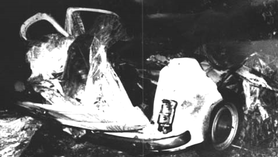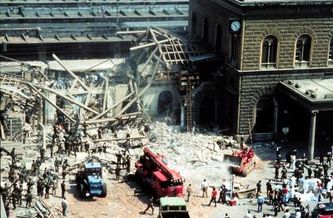Difference between revisions of "Operation Gladio/Exposure"
(Import from parent page) |
m (Added Dutch exposure.) |
||
| Line 59: | Line 59: | ||
{{QB|"The stay-behind effort, in my view, was simply to be sure that if the worst came to worst, if a Communist Party came into power, that there would be some agents there who would tip us off, and tell us what was happening and be around", [[Ray Cline]], [[Deputy Director of the CIA]] from 1962 to 1966, explained for instance in front of Francovich's camera. "It's not unlikely that some right-wing groups were recruited and made to be stay-behinds because they would indeed have tipped us off if a war were going to begin, so using right-wingers, if you used them not politically, but for intelligence purposes, is o.k.", Cline went on the record. The papers on the next day in London reported that "It was one of those programmes which you imagine will bring down governments, but such is the instant amnesia generated by television you find that in the newspapers the next morning it rates barely a mention."<br/> | {{QB|"The stay-behind effort, in my view, was simply to be sure that if the worst came to worst, if a Communist Party came into power, that there would be some agents there who would tip us off, and tell us what was happening and be around", [[Ray Cline]], [[Deputy Director of the CIA]] from 1962 to 1966, explained for instance in front of Francovich's camera. "It's not unlikely that some right-wing groups were recruited and made to be stay-behinds because they would indeed have tipped us off if a war were going to begin, so using right-wingers, if you used them not politically, but for intelligence purposes, is o.k.", Cline went on the record. The papers on the next day in London reported that "It was one of those programmes which you imagine will bring down governments, but such is the instant amnesia generated by television you find that in the newspapers the next morning it rates barely a mention."<br/> | ||
(DG p.50)}} | (DG p.50)}} | ||
| + | |||
| + | ==Peter R. De Vries & Brandpunt== | ||
| + | {{FA|Quia Oportet}} | ||
| + | {{YouTubeVideo | ||
| + | |code=V4TtP2XRYbY | ||
| + | |align=left | ||
| + | |width=500px | ||
| + | |caption="When you name 'gladio', alarm bells go off at high-positions, and they'll do their best to kill the case". | ||
| + | |date=09-09-2007 | ||
| + | }} | ||
| + | |||
| + | Up until the 1990s the Dutch government never admitted Gladio to exist. Several weapon stashes were found and reported by [[corporate media]], but mayors, prosecutors, and other high-ranking officials all denied knowing the origins. Even when newspaper Elsevier released an article naming several Dutch [[spooks]] and "at least two MPs as [[KGB]]-agents by our source, a spook himself.<ref>https://www.groene.nl/artikel/de-zweedse-connectie</ref>, later revealed to be CIA-agent [[Carl Armfelt]]." | ||
| + | [[Ruud Lubbers]] admitted<ref>https://www.digibron.nl/viewer/collectie/Digibron/id/tag:RD.nl,19901114:newsml_6f583713cfc6d8985618d8c237bd11a8</ref> the existence in [[1990]] of a Dutch division of the [[Operation Gladio]]-network. Lubbers denied the division to have bombed anything, and downplayed the activities massively. A [[Belgian]] agent revealed to Amsterdam main newspaper Het Parool that the Belgian and Dutch Gladio-networks were in fact actively working together, meeting regularly.<ref>https://www.bendevannijvel.com/forum/viewtopic.php?pid=48807#p48807</ref> | ||
| + | |||
| + | {{SMWQ | ||
| + | |authors=Peter Rudolf de Vries | ||
| + | |text=When we began 4 years ago with this case, we couldn't believe this lawyer, but now I can't deny it any more. We discovered that the justice departments in [[Belgium]], [[The Netherlands]] and in particular in [[Amsterdam]] have made several cases in international weapons smuggling silently disappear. These departments have consistently remarked that illegal ownership of [[weapons]] would be tackled directly. I can't deny that this has happened on purpose. Of course, the [[Dutch]] Ministry of Justice makes mistakes that sometimes have sad consequences, but, these volumes, this stubborn, and this simple can only happen if it was your intention all along. Admitting it, they will never do, because you'd have to admit '''why''' you did this, and the experiences from the [[1980s]] with [[Gladio]] learns that these sort of deals will be denied till the bitter end. Which means we'll probably never know of the exact dealings. | ||
| + | |source_name=Op1 | ||
| + | |source_URL=https://www.youtube.com/watch?v=V4TtP2XRYbY | ||
| + | |date=2007 | ||
| + | |subjects=Dutch Ministry of Justice and Security, Inlichtingen en Operatiën, Operation Gladio, Amsterdam, Belgium/Deep State, Dutch Deep State | ||
| + | }} | ||
| + | |||
| + | De Vries was contacted by a lawyer in the [[2000s]] and started a 4 year investigation into a former [[weapons]] depot in [[Amsterdam]], and discovered the government to have used the store for [[weapons smuggling]], with [[Belgian]] police inspectors linking it to infamous cases, such as the [[Brabant Massacres]]. | ||
| + | A company listed [[Quia Oportet]] is secretly listed elongation of the Dutch Gladio divisions with a founding date of [[1992]]... with an alleged end date just months after [[9-11]]. | ||
| + | |||
| + | Dutch public broadcaster Brandpunt released their own interview with several Gladio-members in the [[2000s]], revealing the network to be still allocated funding up until [[9-11]] at least with a codename [[Quia Oportet]]. | ||
| + | De Vries was shot dead by hitmen of the leading [[cocaine]] traffickers in the EU in [[2021]]. | ||
| + | |||
| + | |||
{{SMWDocs}} | {{SMWDocs}} | ||
==References== | ==References== | ||
{{reflist}} | {{reflist}} | ||
Revision as of 11:52, 20 November 2021
| Location | Italy |
|---|---|
| Description | Operation Gladio was exposed in Italy by the research of Italian judge Felice Casson. |
Operation Gladio has been exposed since operational details are now publicly available, and official bodies such as national governments and NATO have admitted that the operation existed. However, although some low level operatives have been imprisoned, key parts of it remain hidden. The Operation Gladio/B claims made by Sibel Edmonds are not part of the official record - the US authorities chose to subject her to legal gagging order.
Contents
Earlier discoveries
In 1972 an arms cache was discovered near Trieste containing C4 explosive identical to that used in the 1972 Peteano bombing.
In 1978, Norwegian Police tracking a small scale illegal moonshine operation stumbled on a cache of arms in a secret basement under the house of shipowner/spook Hans Otto Meyer. Norway's Minister of Defence, Rolf Hansen told the Norwegian parliament admitted that privately organized resistance groups were controlled by the intelligence agencies, but denied that they were answerable to NATO and dismissed any connections to the CIA.[1]
Felice Casson
In 1984 an Italian judge Felice Casson reopened the case of a car bomb in Peteano in 1972 and uncovered a series of anomalies in the original investigation. General Mingarelli, head of the head of the caribinieri in the Udine region, was later found guilty of diverting this investigation and sentenced to 10 years (later reduced to 2½ years).[2]

Following the discovery of an arms cache near Trieste in 1972 containing C4 explosives identical to that used in the Peteano attack, Casson's investigation revealed that although originally blamed on the communist Red Brigades, the bombing in Peteano was the work of the military secret service Servizio Informazioni Difesa in conjunction with Ordine Nuovo.
Judge Casson’s investigation also revealed that the 1972 Peteano bombing was the continuation of a series of bombings begun at Christmas 1969, the most well-known of which, on the Piazza Fontane in Milan, killed 16 and injured 80. The bombing campaign culminated on 2 August 1980 with a massive bomb in the waiting room of Bologna railway station which killed 85 and injured 200.
The Strategy of Tension
- Full article: Strategy of Tension
- Full article: Strategy of Tension
During his trial, Vincenzo Vinciguerra revealed that, in addition to discrediting left wing political groups, there had been a second aim behind the bombings - to inculcate a climate of fear among the general populace. This was known as the 'strategy of tension' which was intended to generate a pervasive sense of fear which would encourage the population to appeal to the state for protection. As Vincenzo Vinciguerra summarized during his trial:
‘You had to attack civilians, the people, women, children, innocent people, unknown people far removed from any political game. The reason was quite simple. They were supposed to force these people, the Italian public to turn to the State to ask for greater security.’
Daniele Ganser - NATO's Secret Armies: Operation Gladio and Terrorism in Western Europe
In Francovich's documentary on Gladio, he described the aim as to ‘destabilise in order to stabilise’… ‘To create tension within the country to promote conservative, reactionary social and political tendencies.’
SISMI Archives
In 1990 Judge Casson was given permission by Prime minister Giulio Andreotti to search the archives of the Italian military secret service Servizio informazioni sicurezza Militare) where he found proof of the existence of the Gladio network, and links to NATO and the United States. Following this, on 3 August 1990 prime minister Andreotti confirmed to parliament the existence of the Gladio networks but claimed they had ceased operating in 1972. This was subsequently revealed to be false by the Italian press. Andreotti then admitted the existence of the Gladio networks and their connection to NATO.
The secret Gladio army, as Andreotti revealed, was well armed. The equipment provided by the CIA was buried in 139 hiding spots across the country in forests, meadows and even under churches and cemeteries. According to the explanations of Andreotti the Gladio caches included 'portable arms, ammunition, explosives, hand grenades, knives and daggers, 60 mm mortars, several 57 mm recoilless rifles, sniper rifles, radio transmitters, binoculars and various tools'. Andreotti's sensational testimony did not only lead to an outcry concerning the corruption of the government and the CIA among the press and the population, but also to a hunt for the secret arms caches. Padre Giuciano recalls the day when the press came to search for the hidden Gladio secrets in his church with ambiguous feelings: 'I was forewarned in the afternoon when two journalists from "Il Gazzettino" asked me if I knew anything about arms deposits here at the church. They started to dig right here and found two boxes right away. Then the text also said a thirty centimetres from the window. So they came over here and dug down. One box was kept aside by them because it contained a phosphorous bomb. They sent the Carabinieri outside whilst two experts opened this box, another had two machine guns in it. All the guns were new, in perfect shape. They had never been used.'
(DG p. 12)
But he denied the claim of Vinceguerra that the Gladio armies had been involved in the domestic terrorism the country had witnessed. Despite that, a parliamentary commission in 2000 investigating Gladio explicitly rejected his denial and concluded to the contrary:
‘Those massacres, those bombs, those military actions had been organised or promoted or supported by men inside Italian state institutions and, as has been discovered more recently, by men linked to the structures of United States intelligence.’
(DG p.14)
The EU Debate
In all, 12 EU countries were affected and on November 22 1990 the European Parliament debated the issue.
The tone was set by Greek parliamentarian Ephremidis:
'Mr. President, the Gladio system has operated for four decades under various names. It has operated clandestinely, and we are entitled to attribute to it all the destabilization, all the provocation and all the terrorism that have occurred in our countries over these four decades, and to say that, actively or passively, it must have had an involvement.' Ephremidis sharply criticised the entire stay-behind network: 'The fact that it was set up by the CIA and NATO which, while purporting to defend democracy were actually undermining it and using it for their own nefarious purposes.'
(DG p.21)
Allan Francovich's 1992 Film
- Full article: Operation Gladio (film)
- Full article: Operation Gladio (film)
John Major's government continued to peddle the line of not commenting on matters of national security but headlines continued. Newsnight in April 1991 highlighted the evidence that the Gladio networks had operated politically with subversion of the Left. This was reinforced a year later in three ground-breaking documentaries for the BBC by Allan Francovich. Francovich made extensive use of primary sources, focusing almost exclusively on Gladio in Italy and in Belgium, where he looked at the Brabant Massacres and attempted to connect them to the Gladioesque anti-communist group, Westland New Post. His documentary interviews key figures in Gladio such as Licio Gelli, head of the P2, Italian right-wing activist Vincenzo Vinciguerra, Venetian judge and Gladio discoverer Felice Casson, Italian Gladio commander General Gerardo Serravalle, Senator Roger Lallemand, head of the Belgian Parliamentary inquiry into Gladio, Decimo Garau, former Italian instructor at the Sardinian Gladio base, William Colby, former Director of CIA and Martial Lekeu, former member of the Belgian Gendarmerie to name but a few.
"The stay-behind effort, in my view, was simply to be sure that if the worst came to worst, if a Communist Party came into power, that there would be some agents there who would tip us off, and tell us what was happening and be around", Ray Cline, Deputy Director of the CIA from 1962 to 1966, explained for instance in front of Francovich's camera. "It's not unlikely that some right-wing groups were recruited and made to be stay-behinds because they would indeed have tipped us off if a war were going to begin, so using right-wingers, if you used them not politically, but for intelligence purposes, is o.k.", Cline went on the record. The papers on the next day in London reported that "It was one of those programmes which you imagine will bring down governments, but such is the instant amnesia generated by television you find that in the newspapers the next morning it rates barely a mention."
(DG p.50)
Peter R. De Vries & Brandpunt
- Full article: Quia Oportet
- Full article: Quia Oportet
| "When you name 'gladio', alarm bells go off at high-positions, and they'll do their best to kill the case". |
Up until the 1990s the Dutch government never admitted Gladio to exist. Several weapon stashes were found and reported by corporate media, but mayors, prosecutors, and other high-ranking officials all denied knowing the origins. Even when newspaper Elsevier released an article naming several Dutch spooks and "at least two MPs as KGB-agents by our source, a spook himself.[3], later revealed to be CIA-agent Carl Armfelt." Ruud Lubbers admitted[4] the existence in 1990 of a Dutch division of the Operation Gladio-network. Lubbers denied the division to have bombed anything, and downplayed the activities massively. A Belgian agent revealed to Amsterdam main newspaper Het Parool that the Belgian and Dutch Gladio-networks were in fact actively working together, meeting regularly.[5]
“When we began 4 years ago with this case, we couldn't believe this lawyer, but now I can't deny it any more. We discovered that the justice departments in Belgium, The Netherlands and in particular in Amsterdam have made several cases in international weapons smuggling silently disappear. These departments have consistently remarked that illegal ownership of weapons would be tackled directly. I can't deny that this has happened on purpose. Of course, the Dutch Ministry of Justice makes mistakes that sometimes have sad consequences, but, these volumes, this stubborn, and this simple can only happen if it was your intention all along. Admitting it, they will never do, because you'd have to admit why you did this, and the experiences from the 1980s with Gladio learns that these sort of deals will be denied till the bitter end. Which means we'll probably never know of the exact dealings.”
Peter Rudolf de Vries (2007) [6]
De Vries was contacted by a lawyer in the 2000s and started a 4 year investigation into a former weapons depot in Amsterdam, and discovered the government to have used the store for weapons smuggling, with Belgian police inspectors linking it to infamous cases, such as the Brabant Massacres. A company listed Quia Oportet is secretly listed elongation of the Dutch Gladio divisions with a founding date of 1992... with an alleged end date just months after 9-11.
Dutch public broadcaster Brandpunt released their own interview with several Gladio-members in the 2000s, revealing the network to be still allocated funding up until 9-11 at least with a codename Quia Oportet. De Vries was shot dead by hitmen of the leading cocaine traffickers in the EU in 2021.
References
- ↑ https://apnews.com/a37c019c2b35ad226891e339a9b94d48
- ↑ Operation Gladio (film)
- ↑ https://www.groene.nl/artikel/de-zweedse-connectie
- ↑ https://www.digibron.nl/viewer/collectie/Digibron/id/tag:RD.nl,19901114:newsml_6f583713cfc6d8985618d8c237bd11a8
- ↑ https://www.bendevannijvel.com/forum/viewtopic.php?pid=48807#p48807
- ↑ https://www.youtube.com/watch?v=V4TtP2XRYbY Op1

